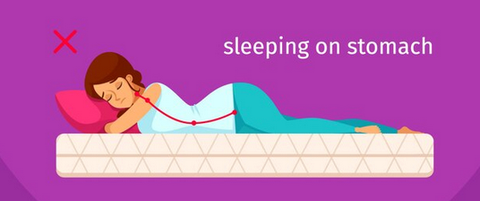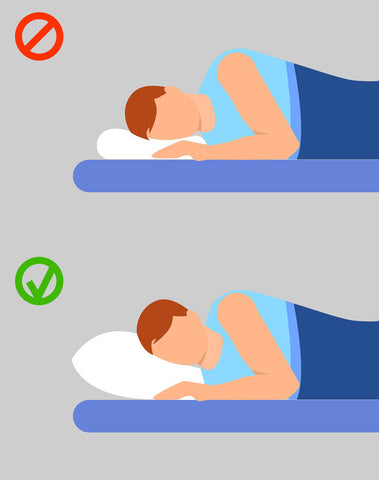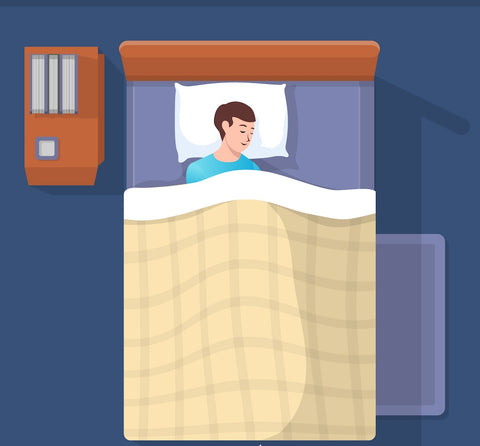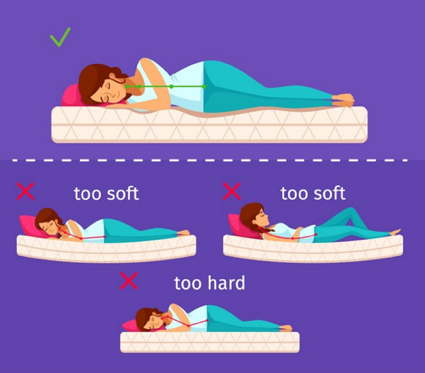Best Sleeping Positions for Shoulder Pain

Does shoulder pain keep you up at night? Many of us know the struggle. Tossing and turning can worsen the ache, making a good night's sleep feel impossible. But there's a simple trick that might help: your sleep position!
This article will show you the best ways to position yourself in bed to ease shoulder pain and finally get that restful sleep you deserve. We'll discuss some common reasons for nighttime shoulder pain and explore some simple strategies you can try to manage the discomfort. By understanding these potential causes and trying some of these tips, you may be able to find relief from the pain and sleep more soundly.
What are the Best Sleeping Positions for Shoulder Pain?
1. Sleeping on Your Back

Why it's great: This position takes the pressure off your shoulders and keeps your spine aligned, promoting good sleep posture.
Tips for Comfort: Use a thin pillow and consider placing a small pillow under your sore arm for a gentle lift.
2. Side Sleeping (On the Non-Painful Side)

Why it's helpful: Sleeping on your non-painful side reduces pressure on the achy shoulder. Here are some tips for ultimate comfort:
Hug It Out: Snuggle a pillow for extra support around your upper body.
Keep Your Spine Aligned: Place a pillow between your knees to keep your spine aligned. Using a full-body pillow can give you some additional support.
3. Slightly Reclined

Why it works: If back or side sleeping isn't working, try a slightly reclined position. This can be a good middle ground, especially if you find flat sleeping uncomfortable.
How to get comfortable: To achieve this position, you can use a wedge pillow or an adjustable bed to raise your upper body slightly.
Sleeping Positions to Avoid
1. Sleeping on Your Stomach

This position can strain your shoulders and neck, especially if you turn your head to one side. If you already have shoulder impingement (where tissues in your shoulder rub against bone), stomach sleeping can make it worse.
2. Sleeping with an Arm Overhead

If you tend to raise an arm above your head while sleeping, it can irritate your rotator cuff muscles and tendons. This can worsen rotator cuff injuries and impingement.
3. Tucking Your Arm Under the Pillow

Doing this might feel cozy, but it can actually put extra pressure on your shoulder joint and force it out of alignment. This can lead to increased pain and discomfort.
Common Shoulder Pain Causes and How to Sleep Better While Having Them

1. Rotator Cuff Injury or Issues (Achy Shoulder Muscles)
This common problem involves irritated or torn muscles and tendons around the shoulder joint. It often comes from repetitive motions like throwing or lifting.
Sleep Fix: Snuggle up on your back with a pillow tucked under your affected arm. This elevates and supports your shoulder, taking the pressure off.
2. Shoulder Bursitis
Your shoulder has a tiny, fluid-filled sac that acts like a pillow to keep things moving smoothly. This sac is called a bursa. Sometimes, the bursa can get swollen and irritated. This is called shoulder bursitis. It often happens from an injury, repetitive motions or leaning on your shoulder for too long.
Sleep Fix: To sleep comfortably, try your back instead of your sore side. Use a pillow under your shoulder for a little extra lift.
3. Frozen Shoulder
This condition makes your shoulder joint feel tight and painful, limiting your movement. It can develop after an injury or if you haven't been using your shoulder much.
Sleep Fix: Similar to bursitis, sleeping on your back with a pillow under your sore shoulder provides comfort and keeps it from getting pinched.
4. Shoulder Impingement
Imagine a crowded local pushing on you – that's kind of what happens with impingement. When you lift your arm, the shoulder blade rubs against your tendons, causing pain. It often comes from overuse and can cause inflammation and pain.
Sleep Fix: Try sleeping on your uninjured side or on your back with a pillow gently cradling your sore arm. This keeps your shoulder slightly elevated, easing the pressure.
5. Osteoarthritis
Think of this as the cartilage in your shoulder wearing down over time, leading to pain and stiffness. It's most common as we age.
Sleep Fix: Sleeping on your back is best to avoid putting extra stress on your affected shoulder. Use a supportive pillow to keep your neck and spine aligned, promoting a pain-free sleep.
Adjust/Upgrade Your Sleep Setup to Ease Shoulder Pain
1. Select the Right Pillows

Selecting the right pillow is important to keep your head and neck aligned with your spine, reducing strain and the risk of shoulder pain. A supportive pillow can ease pressure on your shoulders, helping you relax during the night. Whether you prefer a wedge, backrest, or body pillow, choose one that suits you best.
Using a body pillow can help you stay still while sleeping, preventing you from accidentally rolling over and hurting yourself, especially if you often experience shoulder pain. Consider getting a full-size body pillow or using smaller pillows placed between or under your knees, arms, and back for added support.
2. Upgrade Your Bed

If you can spare some cash, you might want to think about making a couple of targeted improvements to your bed setup to enhance your sleep quality. One suggestion is considering an adjustable bed, which allows you to sleep with your head raised, easing the strain on your shoulders. While it may require a bit of an investment, it could be a worthwhile choice, especially if you struggle with ongoing shoulder pain that disrupts your sleep.
3. Get a Mattress That Fits Right

When choosing a mattress, it's important to find one that can ease shoulder pain and prevent it from coming back. The best mattress should be soft enough to cushion your joints, especially in the shoulders, while still providing enough support to keep your spine, shoulders, neck, lower back, and knees in good shape. If a mattress is too firm, it might put too much direct pressure on your joints. On the other hand, if it's too soft, it might not support your back properly, leading to discomfort.
Experience the ultimate in sleep comfort with Flo Mattress. Find your perfect night's rest now!
Other Ways to Relieve Shoulder Pain
Beyond sleep position adjustments, these strategies can help manage your shoulder pain:
1. Over-the-Counter Pain Relief: 
Nonsteroidal anti-inflammatory drugs (NSAIDs) like ibuprofen and naproxen can help reduce inflammation and ease pain. Always follow the directions on the label or as instructed by your doctor.
2. Ice and Heat Therapy: 
Reduce inflammation with ice packs applied to your shoulder for 15 minutes at a time, a few times a day. Before bed, use a heating pad to help loosen tight muscles and ease discomfort.
3. Gentle Stretches:

Sleeping in one position for a long time can leave your shoulders stiff. Adding some gentle stretches to your morning and night-time routine can improve blood flow to your muscles and joints. This may help reduce pain throughout the day and potentially improve your sleep quality as well.
4. Maintain Good Posture:

Keeping good posture throughout the day helps keep your shoulder muscles and tendons aligned. This can prevent strain and weakness in your back and spine. Aim for relaxed shoulders that aren't hunched forward.
5. Consider Acupuncture:

While research is ongoing, acupuncture may offer short-term improvement in shoulder pain. Talk to your doctor to see if it could be a good option for you.
Closing Thoughts
Finding the right sleep position can make a big difference in managing shoulder pain and getting a good night's rest. This article offered some tips and tricks to help you find comfort. Remember, using the right pillows and mattress, along with addressing the cause of your pain with your doctor, can all contribute to long-term relief.
Consider Flo Mattresses for your needs. The Flo Orthopedic Mattress features PainRelease™ technology, specifically designed to reduce shoulder, back and body pain, providing targeted support where you need it most. For those seeking natural spine alignment, The Flo Latex Mattress is an excellent choice, as it supports the spine and joints exceptionally well.
Addressing the cause of your shoulder pain with your doctor, coupled with the strategic use of Flo Mattresses, can pave the way to a pain-free night’s sleep. Give these strategies a try and experience the difference for yourself.
The key to a good night's sleep is the right mattress. Flo Mattress offers top-notch quality and comfort for your sleep sanctuary.